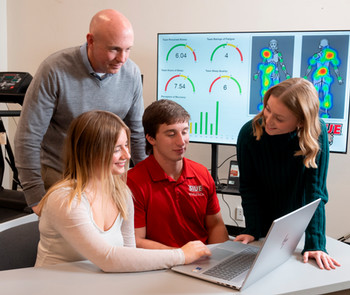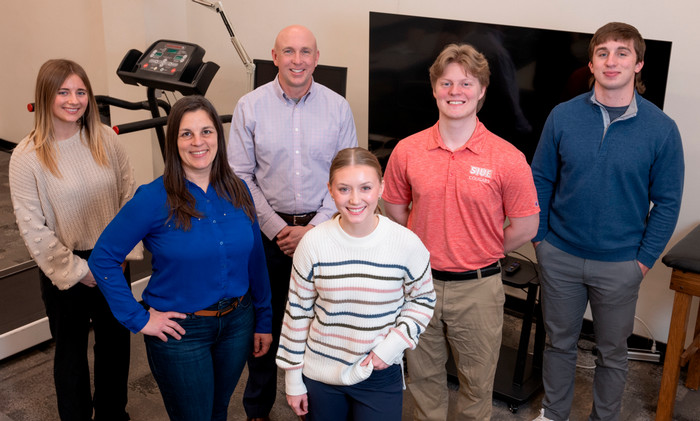SIUE’s Dr. Josh Wooten Uses Performance Survey Data to Support Women Volleyball Players
Survey Gives Coaches Insights on how to Better Help Athletes
 Most people would agree that there is more to an athlete than what meets the eye, and Southern Illinois University Edwardsville’s Josh Wooten, PhD, professor and chair of the Department of Exercise, Sport, and Nutrition Sciences, has been working to quantify that information and parlay it into a more healthy, well-balanced and adept player.
Most people would agree that there is more to an athlete than what meets the eye, and Southern Illinois University Edwardsville’s Josh Wooten, PhD, professor and chair of the Department of Exercise, Sport, and Nutrition Sciences, has been working to quantify that information and parlay it into a more healthy, well-balanced and adept player.
The means in which Wooten and his team plan to help reach this goal is through a Performance Survey for SIUE’s women’s volleyball team.
In developing the Performance Survey, Wooten realized the volleyball coaching staff wanted to better understand and quantify both psychosocial and physical factors that may influence the performance of their athletes.
“Our primary aim was to provide the team’s coaches and support staff with data they need to make decisions that would maximize player readiness and reduce the risk for injury during their competitive season,” said Wooten. “Our hope was that the data collected from the Performance Survey, in combination with related performance data, would address this aim.”
Wooten began developing the Performance Survey in the fall of 2023 with Stephanie Cameron, PhD, instructor and certified mental performance consultant in the Department of Exercise, Sport, and Nutrition Sciences, and Josh Behary and Max Hardiek, Undergraduate Research and Creative Activities (URCA) assistants. The group developed the survey using an evidence-based approach and collected data and provided reports to coaches regularly throughout the 2023-24 season.
 “Dr. Cameron and I approached the request as consultants to assist the coaching staff, and not as scientists trying to answer a specific research question or project,” he said.
“Dr. Cameron and I approached the request as consultants to assist the coaching staff, and not as scientists trying to answer a specific research question or project,” he said.
It was during the 2024 pre-season training that Wooten and his team continued their work with the volleyball team with a more comprehensive Performance Survey and collected additional data to assist the coaching staff. The survey evaluated the following areas: mood, energy/fatigue, stress, sleep, muscle soreness, perceived training intensity and training volume.
“During the 2024 season, our research group saw the value in the data we were collecting and how this could benefit more than just SIUE’s athletes,” said Wooten. “Following the Institution Review Board approval, our research group began using the data collected to explore questions about performance and recovery in the female athlete.”
“Our research group works as a team on all projects,” noted Wooten. “Some examples include writing of manuscripts and data management and analyses. We also have weekly journal club meetings to update the group on the status of project objectives, and the discussion of research papers presented by team members. The collaboration between team members builds translational skills that the undergraduate research assistants can use throughout life.”
The primary goal of the research team is to involve students in research that promotes an exciting environment that promotes professional (and personal) growth, Wooten emphasized.
“Research and our project have taught me the implications and impact that research can have on sports,” Hardiek, a junior majoring in biomedical sciences. “Personally, research has taught me to be consistently curious and always seek to learn more.”
In conducting research, objectives are created to best arrive at conclusions. One key research objective for Wooten’s group was to identify and better understand gender disparities occurring in sport science and sport medicine.
“For example, URCA research assistants Grace Karolewicz and John Western are performing audits of the literature evaluating ankle injuries in female basketball players,” said Wooten. “Audits are an evaluation of the literature with the purpose to better understand female athlete representation on a specific topic or discipline in sport science and sports medicine.”
“To identify gaps in the literature, I have URCA research assistants Hardiek and Izzy Melton, performing a systematic review evaluating sleep and performance in female volleyball athletes,” he explained. “In contrast to audits, a systematic review is comprehensive evaluation of the literature on a topic or question.”
Hardiek offered more information on his role in the project. “Over the course of this year and last year, I have been responsible for gathering baseline knowledge on physiological markers in volleyball athletes and the effects on performance and recovery, he said. “A graduate research partner and I developed the first versions of the performance survey, laying the groundwork for what we are currently doing with the SIUE Volleyball program.”
The research and its potential implications are complex, multifaceted and ongoing, shared Wooten.
“Our group constantly looks at ways to incorporate and challenge best practices to push our understanding of sport, and to further improve the female athlete throughout their career,” he said. “In addition, using a sport-to-bedside approach, we hope to translate our findings to improving the health of women across their lifespan. For the student researchers, they will share their research at both regional and national conferences, such as the American College of Sports Medicine or National Strength and Conditioning Association annual meetings.”
“To expand our data collection efforts during the 2024 season, we also conducted body composition analyses,” said Wooten. “It is common for athletes to lose body weight and lean muscle mass during their competitive season.”
Body composition data in combination with physical performance data provided by Athletic Performance Coach John Reape would be a valuable addition to the Performance Survey to assist the team’s coaching and support staff to make data driven decisions about training, injury prevention or treatment and nutrition, according to Wooten.
“Besides generating daily reports for coaches and support staff, we also created player reports every 30-days for each athlete on the team, so that they can monitor their own data throughout the season,” he added. “We felt that it was equally important for the players to see their data to enhance their competitive readiness.”
At the end of the season, the data collected will be used for research-related purposes to address gaps in the literature, noted Wooten.
Currently, the survey has only been used with women’s volleyball, but Wooten looks forward to building in additional sports over time.
“I have enjoyed a lot about our research,” said Hardiek. “Developing relationships with Dr Wooten, other faculty, and my fellow URCA assistants have been very enjoyable and rewarding. Additionally, having a positive impact on our university’s sports programs and learning much along the way has been a huge plus.”
Photos:
Josh Wooten, PhD, professor and chair of the Department of Applied Health, looks on as his students (left to right) Grace Karolewicz, Max Hardiek and Izzy Melton review performance survey data.
Front row (left to right): Dr. Stephanie Cameron and Izzy Melton
Back row (left to right): Grace Karolewicz, Dr. Josh Wooten, John Western and Max Hardiek.









